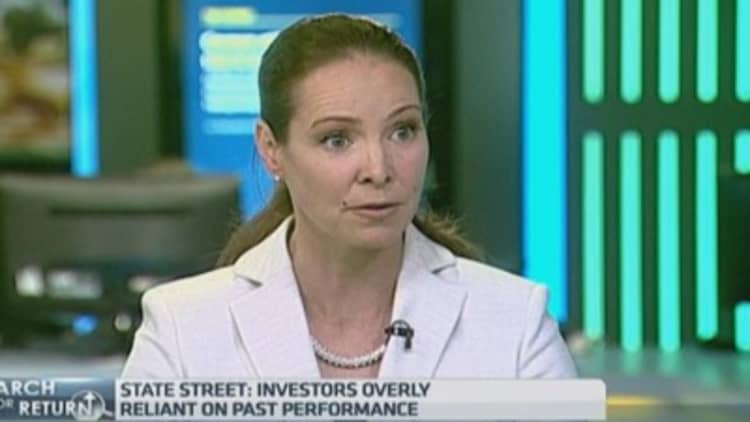Stop me if you've heard this one before: The hedge fund industry has put in safeguards to make sure the next crisis is nowhere near as bad as the last.
That's the case being made by Don Steinbrugge, managing partner at Agecroft Partners, a consulting firm that works with hedge funds and firms that specialize in alternative investments.
In rejecting assertions that the bonanza of zero interest rates and trillions in Federal Reserve money-printing has created an asset bubble, Steinbrugge argues that the hedge industry is far more stable than it was in 2008. That was when firms making bets in subprime mortgages and other high-risk areas of debt nearly collapsed the global financial system and themselves lost about $1.1 trillion, according to recent estimates.
He makes five points to bolster his argument that should markets get rocked like they did then — stock indexes lost about 60 percent of their value — hedge funds are better positioned to withstand the shock:

1. The industry make-up has changed from short-term focused to longer-term and from the high-risk high-return approach to one that favors more stable assets.
Read MoreHedge funds playing buy-and-hold, and losing
2. There's "significantly less" leverage in the industry, due in part to the crisis washing out most of the firms that couldn't cover margin calls or liquidity withdrawals once the crisis exploded.
3. Investors have a better understanding now of how liquid or illiquid their investments are. During the crisis, Steinbrugge argues, investors either were frustrated by not being able to free their money from locked-up funds, or hurt more liquid funds by withdrawing in panic. He believes a "better alignment" of liquidity terms and funds will help prevent panic and the corresponding loss of confidence in the hedge industry.
4. Here's where it gets a little scary: Steinbrugge believes there's a "lower probability" of another scandal on the proportion of Bernie Madoff, in which the high-rolling hedgie bilked clients in the biggest Ponzi scheme in history. "Since that terrible event, there has been a significant enhancement in the due diligence process of many investors to reduce the probability of fraud, including a greater focus on transparency, operational due diligence and the quality of service providers," Steinbrugge said.
Read MoreTepper to return billions to clients despite loss
5. There's a lack of good alternatives. For pension funds and other institutional investors, money markets and government bonds provide yields that are too low. Even though hedge funds are on a long streak of underperforming basic market benchmarks like the , they're still the best game in town for the big boys. "We believe institutional investors view hedge funds as more attractive if they are concerned about a market selloff. In addition, once the market actually does sell off, investors' emotional response is the market can always go lower, which again makes hedge funds look attractive," he said.
Of all of Steinbrugge's arguments, the final point is the easiest to make.
Despite a modest 2 percent return this year, hedge funds have seen assets grow past the $3 trillion mark, according to industry tracker eVestment. October's market turmoil and liquidity worries did generate nearly $3 billion in redemptions, but the last three months have seen inflows of $6.3 billion, part of the $103.7 billion in inflows for 2014 through October.
As for the other points: Asserting there are no Bernie Madoffs hiding in the weeds or that investors have better educated themselves regarding the risks of long lock-ups seems a little overconfident or maybe naive. As we've seen from the long line of criminal prosecutions this year in the securities industries, there is no shortage of fraudsters nor of those willingly duped into believing outrageous investment claims.
Read MorePro's 10 signs you've been on Wall St too long
Also, the statement about less leverage seems hard to square. Margin debt on the New York Stock Exchange was at $453.8 billion for October, off from record levels hit earlier this year but 10 percent higher than a year ago.
In a paper released earlier this year, the San Francisco Fed not only asserted that hedge funds remain a danger but also posited that they are actually at the core of financial instability.
Hedge funds, the paper said, "adversely affect" commercial and investment banks as well as insurance companies.
"During crises, the spillovers become very large, making hedge funds more important transmitters of shocks than commercial banks or investment banks," economist Reint Gropp wrote.
"If highly leveraged hedge funds are forced to liquidate assets at fire-sale prices, these asset classes may sustain heavy losses," he added. "This can lead to further defaults or threaten systemically important institutions not only directly as counterparties or creditors, but also indirectly through asset price adjustments."
Read MoreBest hedge fund bet of 2014 is...India?
Of course, if what Steinbrugge says about less risk-taking is true, then those damages can be at least mitigated.
History, though, isn't on the hedge fund industry's side in that regard.
As Gropp wrote: "We find that hedge funds may play an even more prominent role in transmitting shocks to the rest of the financial market, and thus may amplify systemic risk more than previously thought."






